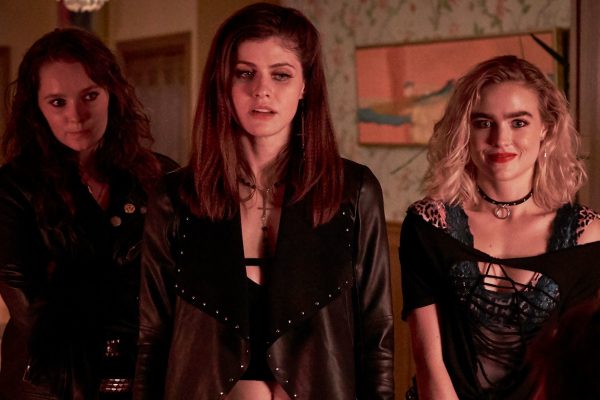Satanists get a bit of a bad reputation, don’t they? Whether it’s John Carpenter’s hideously underappreciated Prince of Darkness, or the more recent The Blackcoat’s Daughter, the blurring of humanity and its association with the Devil is as ancient a narrative tool as possible. Then there were the slasher films of the late seventies through to the early nineties, a genre which gluttoned itself with zealous-religious killers. Marrying the two together made just about as much sense as it does now, as We Summon the Darkness begins with news reports of satanic cultists slaughtering innocents across eighties America, just as three young women embark on their road trip to the biggest ’80s metalhead gig around.
Unfortunately for our lead, Alexandra Daddario once more showcases her inscrutable taste in film choices. It’s by far the most cohesive performance in the film, principally for how out-there Daddario pushes the character, plunging headfirst into the eighties schlockfest of video nasties and cultist slasher flicks. Continuing this, Daddario’s co-stars Maddie Hasson and Amy Forsyth are giving tremendous energy to the film – Forsyth as a young runaway, who turns to the girls for support, brings an unexpected dynamic to the film. The imbalance between performances occurs with the men, where attempts are made at gender reversal and a comment on the ‘lamb to slaughter’ nature of women in preceding slasher films. The execution fails to convey this naturally, stemming from the meek direction, flimsy writing, and vacant performances. While the women can capitalise on their antagonism, the guys just aren’t bringing anything memorable to the table.
This gender reversal is almost well-constructed, exhibiting an otherwise unexpected depth. Placing the men as powerless, now-stripped pieces of gaze material to be massacred is a clever aspect to take, but the film doesn’t run with the concept for long. The revelation that a patriarchal cultist is manipulating these young women removes the agency they have, going against what has been set up. While the notion of a female killer is far from original, the trio had potential as a unique force, particularly in the droning era of post-modern slashers where remakes from the golden ’80s era are cycling the motions. There’s a small, niche territory of genuine pieces which distort the conventions such as The Guest or It Follows, and We Summon the Darkness had the promise to join these and reclaim the genre from television, which seems to have taken up the mantle.
Giving Marc Meyers credit, We Summon the Darkness superficially achieves what it sets out to in capturing a distinctly cult/slasher flair. Ridiculous, and borrowing heavily from more engaging films, We Summon the Darkness drapes itself in attempted pastiche but fails to cover itself in much bloodshed. For a script that has glints of wickedness, it plays it remarkably safe. The threat posed to the trio is almost immediately doused by the inadequacies of the cultists, whose ineptitude and inexperience, while a plot point, serves little in the way of horror. An inexperienced killer should be terrifying, their motivations clouded, but instead, it strips any power from the points the film is attempting to make.
Beneath the slasher homages and incessant borrowing from the horror library, We Summon the Darkness wastes rich potential as it falls victim to its execution. Leaning on the angle of nostalgia, suffering from tedious performances, and a substantial lack of terror means any attempts at a neo-slasher going for the throat of misogyny is all but put to rest by Meyers’ inability to brandish these weapons effectively.
Available on VOD now
